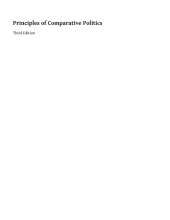Parliamentary, Presidential, and Semi-Presidential Democracies - Making and breaking governments in parliamentary democracies
4 important questions on Parliamentary, Presidential, and Semi-Presidential Democracies - Making and breaking governments in parliamentary democracies
The government in a parliamentary democracy comprises:
- A prime minister: the political chief executive and head of the government
- The cabinet: composed of ministers whose job it is to be in the cabinet and head the various government departments.
Collective cabinet responsibility refers to:
Not only is there considerable variation in the length of time that it takes to form governments but there are also large differences in the amount of time that various governments stay in power. Governments end for two sorts of reasons:
- Technical reasons: thinks that are beyond the control of the governments.
- Discretionary reasons: political acts on the part of the government or opposition.
- Higher grades + faster learning
- Never study anything twice
- 100% sure, 100% understanding
In some countries, the government gets to choose when it wants to hold elections. We refer to this possibility as endogenous timing. Three different stories have been proposed to explain the timing of elections:
- Political surfing: waits until the economy is right
- Political business cycling: manipulates the economy
- Signaling: worse economic times are expected
The question on the page originate from the summary of the following study material:
- A unique study and practice tool
- Never study anything twice again
- Get the grades you hope for
- 100% sure, 100% understanding

Topics that are related to Parliamentary, Presidential, and Semi-Presidential Democracies - Making and breaking governments in parliamentary democracies
-
Parliamentary, Presidential, and Semi-Presidential Democracies - Making and breaking governments in parliamentary democracies - Government formation process
-
Parliamentary, Presidential, and Semi-Presidential Democracies - Making and breaking governments in parliamentary democracies - A simple model of government formation
-
Parliamentary, Presidential, and Semi-Presidential Democracies - Making and breaking governments in parliamentary democracies - Different types of government































